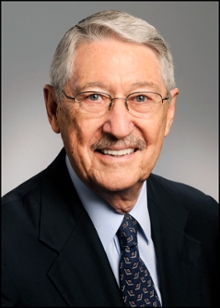
The Japan Prize Foundation has announced Max D. Cooper, MD, as a laureate of the 2018 Japan Prize. Alongside Dr. Jacques Miller, Cooper is being awarded the prize in the category “Medical Science and Medicinal Science” for the discovery of the dual nature of adaptive immunity, which identified the cellular building blocks of the immune system as we understand it today.
The annual Japan Prize awards recognize individuals who are pioneers in their respective fields of medicinal science and resources, energy, environment and social infrastructure. Cooper is one of three scientists recognized this year for original and outstanding achievements that not only contribute to the advancement of science and technology, but also promote peace and prosperity for all mankind. The third recipient of this year’s Japan Prize is Akira Yoshino, who invented the lithium-ion battery, making modern mobile phone and electric vehicle technologies possible.
Cooper is a professor of pathology and laboratory medicine at Emory University School of Medicine and a Georgia Research Alliance Eminent Scholar in developmental immunology. He also is a member of the Emory Vaccine Center, the Emory Center for AIDS Research and the Winship Cancer Institute. Miller is emeritus professor at the Walter and Eliza Hall Institute of Medical Research in Melbourne, Australia.
Cooper and Miller are being honored for deciphering the two types of lymphocyte lineages involved in adaptive immunity, laying the conceptual groundwork for our understanding of nearly all fields touched by immunology.
“We are extremely proud of Dr. Cooper and this tremendous international honor,” says Vikas P. Sukhatme, MD, ScD, dean, Emory University School of Medicine. “His accomplishments have forever altered the face of medicine, and he is continuing to contribute to advancements that will improve the health of individuals for decades to come.”
“The Japan Prize is proud to recognize Drs. Cooper and Miller. Their foundational work has contributed significant knowledge to the advancement of anti-cancer and anti-cytokine drugs for the treatment of autoimmune diseases like rheumatoid arthritis,” says Hiroshi Nakamura, senior executive director of the Japan Prize Foundation. “In being named Laureates of the 2018 Japan Prize, our hope is this recognition will advance the field of science and further our knowledge of how it impacts nearly every aspect of society.”
As a pediatrician, Cooper noticed apparent differences in the clinical manifestations among patients suffering from primary immunodeficiencies, leading him to hypothesize the existence of functionally different cell lineages in the adaptive immune system. To verify this hypothesis, he used chickens without bursa of Fabricius or thymus and found that B (bursa-derived) lymphocytes are required for antibody responses of humoral immunity, while T (thymus-derived) lymphocytes are responsible for delayed-type hypersensitivity responses, graft-versus-host reaction and skin-graft rejection, all of which are mediated by cellular immunity.
Miller discovered that animals subjected to thymic ablation at birth were unable to reject transplanted foreign tissues and succumbed to many types of infections. This discovery demonstrated that the thymus, an organ then considered to be vestigial, is vital for the development and function of the adaptive immune system. He also demonstrated that mouse lymphocytes can be separated into two developmentally and functionally distinct lineages that were later called T and B lymphocytes, and that in mammals, T lymphocytes are produced by the thymus.
The series of studies by Cooper and Miller thus revealed the dual nature of adaptive immunity -- the B lymphocyte-mediated humoral immunity and T lymphocyte-mediated cellular immunity.
These discoveries fueled rapid advancements in both basic and applied sciences, creating ripple effects socially and economically. In recent years, the developments of new anti-cancer drugs (such as immune checkpoint inhibiting antibodies and genetically-modified T lymphocytes) and anti-cytokine antibodies for the treatment of autoimmune diseases, such as rheumatoid arthritis and inflammatory bowel disease, have received great attention in the field of medical and medicinal sciences. These recent accomplishments would not have been possible without the ceaseless efforts in basic immunology and translational research that unfolded in the wake of the pioneering discoveries made by Cooper and Miller.
Cooper is a member of the U.S. National Academy of Sciences, the Academy of Medicine and the American Academy of Arts and Sciences. He is a former president of the American Association of Immunologists. In 2017, he was elected to the Académie des Sciences of the Institut de France and to the Royal Society of London.
His honors include the Founder’s Award of the Society for Experimental Biology and Medicine (1966), Sandoz Prize in Immunology (1990), American College of Physicians Science Award (1994), AAI Lifetime Achievement Award (2000), AAI-Dana Foundation Award in Human Immunology Research (2006), Avery-Landsteiner Prize (2008) and the Robert Koch Prize (2010).
More details about Cooper’s research are available in this Georgia Research Alliance video.
To honor Cooper, Miller and Yoshino, the Japan Prize Foundation will host an award ceremony on April 18, 2018 in Tokyo. Each laureate will receive a certificate of recognition, a commemorative gold medal and a cash award (approximately $220,000 for Dr. Cooper). The Japan Prize is highly competitive: the nomination process ends in February, and, every year from March to November, the Foundation considers the nominations of 13,000 prominent scientists and researchers from around the world.
About the Japan Prize Foundation
The Japan Prize is awarded to scientists and researchers, regardless of nationality, who have made significant contributions to the progress of science and technology, as well as society, to further the peace and prosperity of mankind. While the prize encompasses all fields of science, two fields are designated for the Japan Prize each year. Since its inception in 1985, the Japan Prize Foundation has awarded the Japan Prize to 91 laureates from 13 countries. For additional details about the Japan Prize Foundation and its activities, please visit www.japanprize.jp/en.
